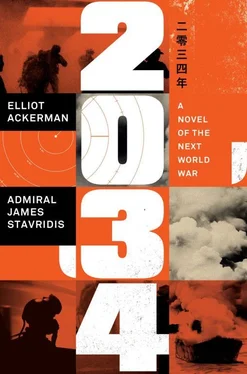“Lin Bao—” Zhao Leji cut him off. “India’s involvement in the conflict is because of a strategic miscalculation. The sinking of the Zheng He is a disastrous consequence of that miscalculation. The Politburo Standing Committee is meeting later today in a secure location. There’s a man outside who will take you to us. We need you to help with our response. Do you understand?”
Lin Bao said that he did.
Zhao Leji hung up.
Silence returned to the room. Then a knock. A man opened the door; he wore a dark suit, and had a powerful build and a blank, anonymous affect. Lin Bao thought he recognized him from Mission Hills.

19:16 July 30, 2034 (GMT+8)
South China Sea
Thirty-seven minutes since launch. Sarah Hunt hadn’t moved in that time. Fixed in the middle of the combat information center, she stood with her arms folded across her chest, staring at a digital display that plotted an approximation of Wedge’s progress from the Enterprise toward his mission’s three targets. Behind her sat Quint, along with Hooper, the pair of them tuning their radios through a desert of static, searching for a return signal.
“Are you sure you’ve got the right frequency?” Hunt asked Quint, trying to restrain her growing impatience.
Quint, lost in his task, didn’t reply.
Beside the digital map was a video teleconference split between two screens. The first screen was INDOPACOM, a conclave of admirals with furrowed brows calling in from Hawaii, none of whom had much to say. The second screen was the White House Situation Room, a smaller group that comprised Hendrickson, another staffer who Hunt didn’t know but who introduced himself as Chowdhury, and in the background Trent Wisecarver, who she recognized from television and who kept getting up to refill his cup of coffee. “Are you sure he’s arrived at the release point?” Hendrickson asked gently.
“Am I sure?” Hunt countered. “No, I’m not sure. That’s only where he’s supposed to be.” Wedge was also supposed to have come up for a last comm check with the Enterprise , but they couldn’t raise him. They were thirty-seven minutes into the mission. At the twenty-eight-minute mark Hunt had received the call from Hendrickson in which he had, with little explanation, ordered her to abort the strike. When Hunt had asked on whose authority, as she was obliged to do, Trent Wisecarver entered the video teleconference’s frame and answered flatly, “On the president’s authority.”
For the past nine minutes they had been trying to contact Wedge.
They’d been met by nothing but static.
“Quint,” snapped Hunt, “are you sure you’re on the right frequency?”
Quint glanced up at her very slowly, his unlit cigarette calmly dangling from his lip. “Yes, ma’am,” he said in a whisper, as if he were consoling her. “I’m sure. He ain’t there.”
“He wouldn’t miss a comm window. It makes no sense,” she said.
Quint replied, “What if it’s exactly what it seems. Maybe he just ain’t there. Maybe those Chinese or those Indians, or whoever, maybe they took him and the whole mission out before they ever got to the release point. Ma’am, it might be they’re all gone.”
On the video teleconference, there was a sharp exhalation, almost like a laugh. It was Wisecarver. He was reclined in a chair, so only half of his body appeared on the screen. He leaned forward. “Well,” he said, “since we’re trying to call off their mission that would simplify things, wouldn’t it?”
The only sound in response was radio static.

18:58 July 30, 2034 (GMT+8)
28°22’41”N 124°58’13”E
Wedge broke hard right, taking on altitude. The corkscrew of smoke climbed from the surface, chasing him skyward. “This is Red Leader, missile launch, my two o’clock!” He was banking hard—as hard as he could—five G, six G, then seven…. He flexed his legs and abdomen, making little grunts as the G-forces sucked the blood downward in his body…. He held there; any more G and he’d black out. Little pinpricks of light burst in his vision like paparazzi cameras as his aircraft pirouetted almost as violently as the missile that he’d lost sight of. He popped chaff and flare from ports on his fuselage, the shards of burning magnesium tumbling in a celebratory arc to confuse the missile’s sensors.
Then a flash behind him, in the direction where the three Hornets that comprised Gold Flight had been assembled. He called out over the radio, trying to confirm what he already knew, which was that he’d lost one aircraft. There was no response. “Gold Leader, this is Red Leader,” he repeated… and then he tried, “Any station, any station, this is Red Leader, over.” For a handful of seconds he spoke into this emptiness until one of the other Hornets formed on his wing. The two held even like a pair of drivers idling at a traffic light. At a glance, Wedge couldn’t tell which of his pilots this was. All he could see was the silhouette gesturing toward its ear, making the universal sign for I can’t hear you.
And another flash.
Smoke enveloped his cockpit. Debris collided with glass. As quickly as the smoke engulfed him, it released him. His aircraft was fine, again flying straight and level. Off his wing, the other Hornet had vanished—incinerated in that flash. He craned his neck forward and could see little flaming pieces of its fuselage drizzling over the ocean, on whose surface Wedge now observed a half dozen other smoking corkscrews, their white tails ribboning skyward. Then behind him in his mirror, Wedge glimpsed a section of four aircraft forming near his six o’clock.
He could see their markings, a green, white, and orange roundel.
Not Chinese—Indian.
Wedge didn’t quite understand. Since when were the Indians allied with the Chinese? Then two more flashes, one off his left wing and another off his right. An alliance between the Indians and Chinese didn’t make any sense to Wedge, but he didn’t have time to consider it. The shock wave from the two explosions came from separate directions, jarring his aircraft. His radio remained silent. He didn’t know who he’d lost or understand who he’d lost them to. He still had a target to reach, and his only chance to reach it was to use these seconds of confusion to slip away, hug the contours of the earth, and head north. His radio was surely being jammed, but he nevertheless called out to whatever remained of the Death Rattlers , ordering all ships to proceed to their targets. And as if in rebuttal to his words, he tracked another explosion high above him as a fifth Hornet was destroyed.
Nose down, afterburners screaming, Wedge descended to below one hundred feet, pulling up so low that his engines blew ripples across the ocean’s surface. Above him, three of the Hornets remained tangled with a gathering number of Indian fighters—perhaps a dozen—which Wedge tracked as the superior Su-35. His Hornets didn’t stand a chance; his pilots’ skill would count for very little, maybe nothing. He knew that they understood this. Even though he couldn’t communicate, he hoped they appreciated that the seconds they remained fighting in the air would be put to good use by him. With the Indians occupied, he’d make his escape, heading north toward Shanghai.
Another explosion behind him.
Then a second.
And eventually a third.
Wedge had the head start he needed. If he stayed below one hundred feet, with luck he’d slip the coastal defenses. Flight time was another twenty-two minutes. He checked his watch. It’d been forty-three minutes since their mission had launched. Even if his radio had worked, his communications window with the Enterprise had closed.
Читать дальше













